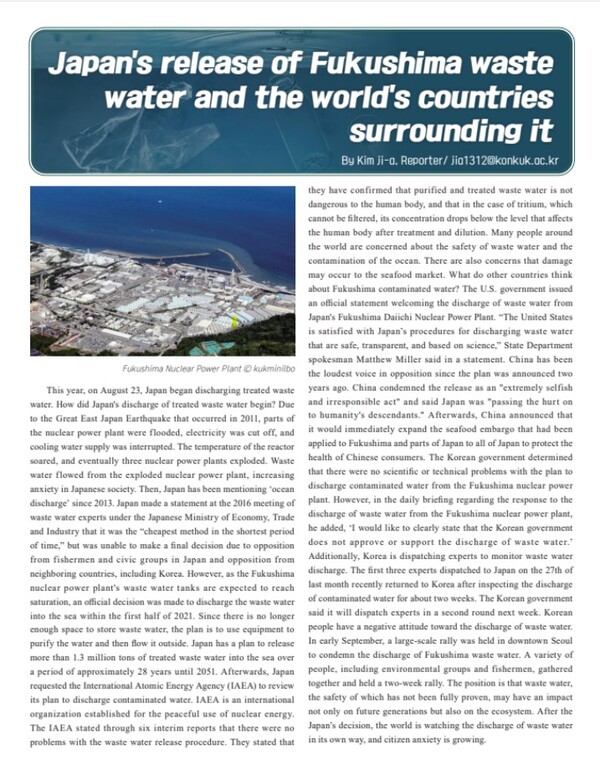Reactions from neighboring countries and world

This year, on August 23, Japan began discharging treated waste water. How did Japan's discharge of treated waste water begin? Due to the Great East Japan Earthquake that occurred in 2011, parts of the nuclear power plant were flooded, eclectricity was cut off, and cooling watcr supply was interrupted. The temperature of the reactor soared, and eventually three nuclear powcr plants exploded. Waste water flowed from the exploded nuclear power plant, increasing anxicty in Japanese society. Then, Japan has been mentioning “ocean discharge’ since 2013. Japan made a statement at the 2016 meeting of waste water experts under the Japanese Ministry of Economy, Trade and Industry that it was the “cheapest method in the shortest period of time,” but was unable to make a final decision duc to opposition from fishermen and civic groups in Japan and opposition from neighboring countrics, including Korea. However, as the Fukushima nuclear power plant’s waste water tanks are expected to reach saturation, an official decision was made to discharge the waste water into the sea within the first half of 2021. Since there is no longer cnough space to store waste water, the plan Is to use equipment to purify the water and then flow it outside. Japan has a plan to release more than 1.3 millson tons of treated waste water into the sea over a period of approximately 28 years until 2051. Afterwards, Japan requested the International Atomic Encrgy Agency (IAEA) to review its plan to discharge contaminated water. IAEA is an international organization established for the peaceful use of nucicar energy The IAEA stated through six interim reports that there were no problems with the waste water release procedure. They stated that they have confirmed that purified and treated waste water is not dangerous to the human body, and that im the case of tritum, which cannot be filtered, its concentration drops below the level that affects the human body after treatment and dilution. Many peoplic around the world are concerned about the safety of waste water and the contamination of the occan. There are also concerns that damage may occur to the seafood market. What do other countries think about Fukushima contaminated water? The U.S. government issued an official statement welcoming the discharge of waste water from Japan's Fukushima Daiichi Nuclear Power Plant. “The United States is satisfied with Japan's procedures for discharging waste water that are safc, transparent, and based on science,” State Department spokesman Matthew Miller said in a statement. China has been the loudest voice in opposition since the plan was announced two years ago. China condemned the release as an “extremely selfish and irresponsible act” and said Japan was “passing the hurt on to humanity's descendants.” Afterwards, China announced that it would immediately expand the scafood embargo that had been applied to Fukushima and parts of Japan to all of Japan to protect the health of Chinese consumers. The Korean government determined that there were no scientific or technical problems with the plan to discharge contaminated water from the Fukushima nucicar power plant. However, in the daily bricfing regarding the response to the discharge of waste water from the Fukushima nuclear power plant, he added, *I would like to clearly state that the Korean government docs not approve or support the discharge of waste water.” Additionally, Korea is dispatching experts to monitor waste water discharge. The first three experts dispatched to Japan on the 27th of last month recently returned to Korea after inspecting the discharge of contaminated water for about two weeks. The Korean government said it will dispatch experts in a second round next week. Korean people have a negative attitude toward the discharge of waste water. In carly September, a large-scale rally was held in downtown Scoul to condemn the discharge of Fukushima waste water. A varicty of people, including environmental groups and fishermen, gathered together and held a two-week rally. The position is that waste water, the safety of which has not been fully proven, may have an mpact not only on future gencrations but also on the ecosystem. After the Japan’s decision, the world is watching the discharge of waste water in its own way, and citizen anxicty Is growing.

